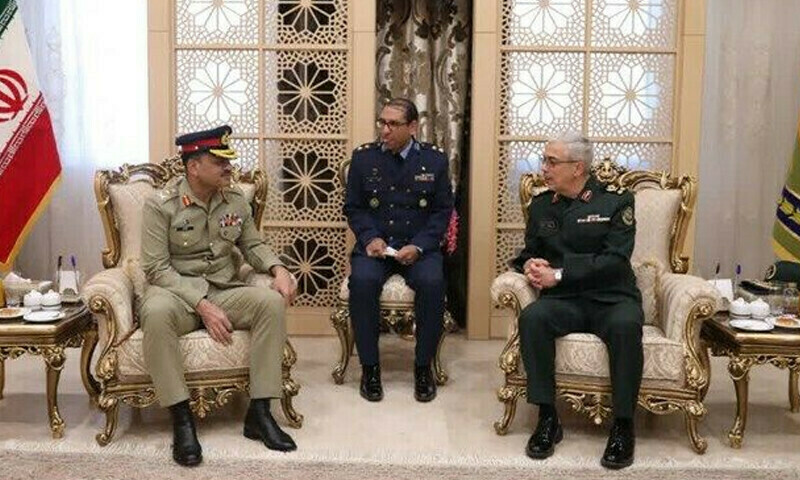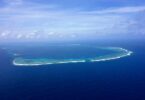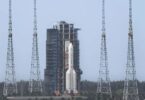A high-level military delegation led by the Chief of Army Staff (COAS) General Syed Asim Munir concluded a two-day official visit to the Islamic Republic of Iran. The Army Chief met with the top civilian and military leadership in Iran including President Ebrahim Raisi, Foreign Minister Hossein Amir Abdollahain, and Iranian Chief of General Staff of Armed Forces, Major General Mohammad Bagheri during his visit to the Islamic Republic. According to the Pakistan Army Media wing, the Army Chief discussed bilateral military relations, regional security, and Counter Terrorism cooperation between the two brotherly nations. As said, the military leadership of the Islamic Republic ofhe military commanders on both sides vowed to eradicate the menace of terrorism in the border areas through intelligence sharing and practical actions against the terrorists’ networks, and explore avenues for enhancing cooperation in the security domain.
Pakistan and Iran are two brotherly Muslim States, first-door neighbors, and friends. Both nations are linked in diverse relationships of history, religion, geography, cultural heritage, and linguistic bonds. However, their socio-religious connections could not be transformed into meaningful economic, trade, and security partnerships over the past decades. Historically, the Successive governments in the country did not make enough efforts to boost bilateral relations with their Western neighbor mainly due to foreign pressure from Riyath and Washington and the unforeseen anxiety linked to global economic sanctions against Tehran, which resulted in non-completion of Pak-Iran gas pipeline and the estranged relationship between the two first door neighbors in the past. In the absence of large-scale government-to-government (G2G) and business-to-business (B2B) trade, the irregular trade and smuggling of Iranian oil and goods had been on the rise, while terrorist groups and foreign pawns excessively used the Pak-Iran border for their illegal movements and terrorist activities on both sides of the border. The reports suggest that Baloch separatist leader Allah Nazar Baloch and his hundreds of terrorists took refuge in Iranian border areas while Iranian officials blamed Iranian Sunni separatist groups for using Pakistani territory for attacking Iran.
Historically, the successive Pakistani governments have a track record of a haphazard policy and taking one step forward and two steps back with respect to the country’s trade and economic ties with Tehran, however, all governments had consensus over improving security ties with Iran to control armed insurgency and terrorism in Balochistan. Interestingly, Iran faces a trust deficiency and remained hesitant in forging an effective security partnership with Pakistan because of Islamabad’s historic security and defense ties with Washington. Over the past few years, Pak-Iran ties had improved significantly. Both nations have set up border markets along their common borders at several places to boost trade and economic activities in their border regions. Similarly, the security cooperation between Pakistan Army and the Iranian military had increased many folds and a comprehensive mechanism had been in place to curb across-border illegal movement, terrorism, smuggling of goods, and drug trafficking between the two countries. During the recent visit of the Army Chief, both nations agreed to increase their bilateral interactions to expand military, educational, defense, and security cooperation. Currently, both sides have a genuine stride towards the comprehensive expansion of ties to achieve the maximum positive outcome of this bilateral endeavor.
In fact, Pakistan and Iran are two important Muslim Countries, and both nations lay at important gestrategic location on the coast of the Indian Ocean and Strait of Hurmoz respectively that act as a gateway to oil riched Gulf region and control important sea trade routes connecting Europe with South and East Asia. Islamabad and Tehran are embattled with local insurgents and terrorist outfits, while both countries face serious repercussions of global rivalry between major powers that restricted their mutual cooperation, and recurrently destabilized these nations to fulfill their strategic objectives in the region. Realistically, both nations fell prey to regional and extra-regional conspiracies, and failed to achieve any remarkable success in the bilateral relations. Both countries have tremendous potential for bilateral trade, economic cooperation, and mutual collaboration in the defense and security domains that will equally benefit Islamabad and Tehan in the future. To that end, both neighbors must remove their mutual distrust, support each other against their common foe and make wholehearted approach to make a shared and prosperous future.







